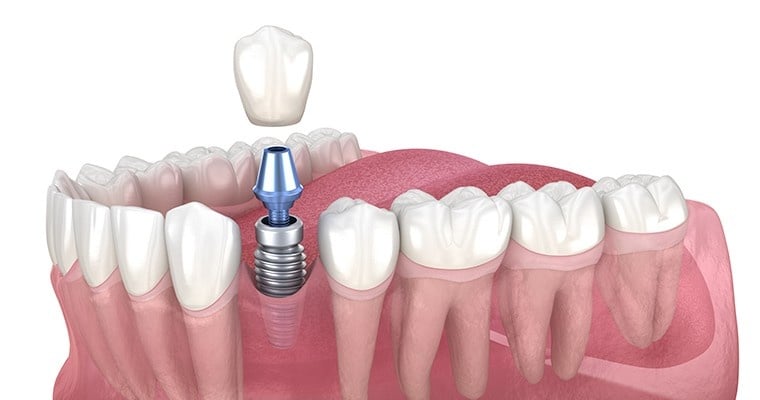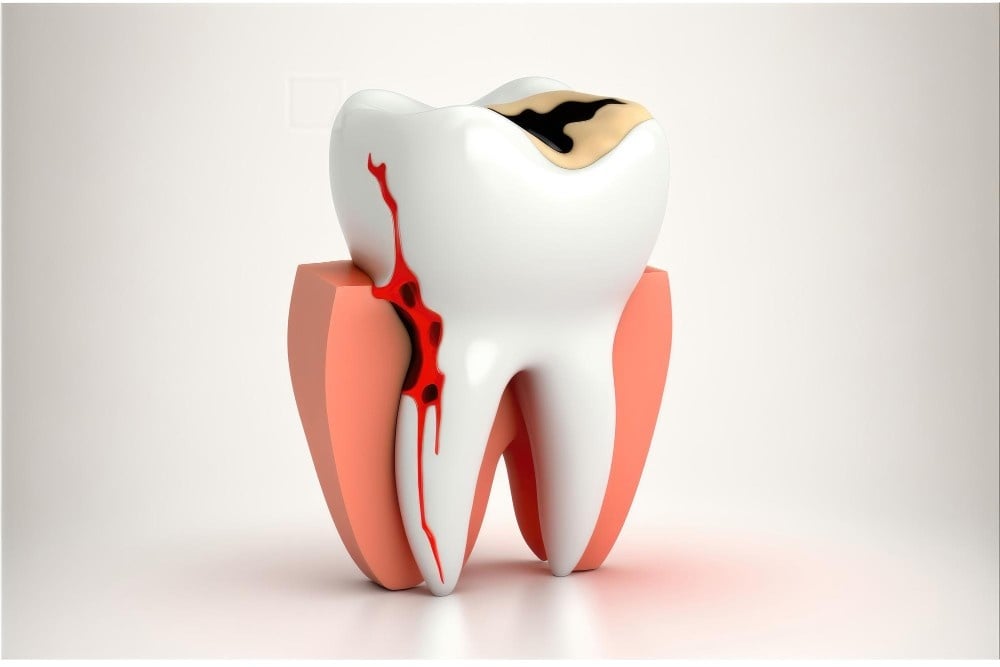When compared to natural teeth, it is a widely known fact that dental implants have a little more risk of experiencing medical issues. The lifespan of the implanted teeth is heavily influenced by how well they are treated and taken care of. Proper upkeep not only saves you the time and money but also minimizes the risk of fute discomfort. For those who have received dental implants it is crucial to be particularly attentive to flossing and brushing, especially below the gum line to safeguard the bone structure that anchors the implanted tooth in the mouth.
Furthermore, thorough and appropriate brushing is essential to safeguard the relatively delicate tooth crown for cracks and chips. To guarantee a maximum possible endurance for the dental implants, it is quite important to avoid any lifestyle habits that can increase the likelihood of developing chips or cracks in the teeth. Now that is said and done, the covering of the fundamental principles, let us delve into each of these techniques for maintaining your dental implants in greater detail:
Why do dental implants come out?
In order to know how to properly take care of dental implants is it crucial to know just why implants can fail, break, or dislodge. A tailored design and placed dental implant can only come loose for two reasons: either the implant root becomes detached from the jaw or the tooth crown itself features. It is quite important to define which is the reason, seeing as the first one is caused by damage to the surrounding gums and bone, while the second is caused by weakness in the artificial tooth. Though there are other causes as to why implants get complex, such as allergies to implant materials, these are exceedingly uncommon.
Given this information, let us now examine how to avoid these two primary causes of tooth loss in implants.
Stop your implant from coming loose by preventing gum disease
If an implanted tooth root comes out, it is almost always due to gum disease (periodontitis) in the gums that surround the implant. The only exceptions to these are if the implant is not placed properly or if your body rejects the implant as a foreign object—in these instances the implant usually comes loose in the first days or couple of weeks after the implant is placed.
Back to gum disease
The bacteria in the mouth that accumulates at the gum line, which is the point in which the gums wrap around the teeth, is to blame for the gum disease. Such bacteria produce acids that lead to gum recession and exposure of the roots of the teeth, alongside with bone that hold them in place. A prolonged exposure to such acids can erode the bone and eventually result in tooth loss. When gum disease causes bone degeneration, the implanted root may become less securely anchored into the jaw, which takes the name peri implantitis. Over time, this process may loosen your implant, eventually resulting in its detachment and loss.
Gum disease is a very prevalent condition that several people will experience at least once in their lives. It can be the cause of tooth loss in a similar way to how dental implants can fall out. Nevertheless, since dental implants are not naturally rooted in the jawbone, they are much more susceptible to being affected by gum disease. That is why it is essential to take extra precaution to prevent gum disease around implanted teeth. To safeguard your implanted tooth from falling out due to gum disease, there are several essential measures you should take:
1) Ensure to floss every day
Whenever plaque bacteria accumulates below the gum line, it can lead to tooth and bone loss. Unluckily, regular brushing only cannot eliminate this bacteria. Flossing, au contraire, can effectively remove harmful bacteria from under the gum line, Because these bacteria can reproduce quickly, it is essential to floss everyday. In the cases you find traditional flossing unpleasant, electric water flossers for interdental brushes are viable alternatives that can also eliminate harmful bacteria from under the gum line.
In plain English, expecting to be free from gum disease sans flossing is as illogical as expecting to be free from cavities without brushing.
2) Be extra cautious when brushing around your implanted tooth
Due to the fact that much bacteria that forms plaque at the gum line originates on the teeth, it is essential to brush the implanted tooth thoroughly to prevent any plaque accumulation. Nonetheless, it is crucial to note that thorough brushing does not mean brushing forcefully. As a matter of fact, excessive brushing can cause tooth damage. Instead, thorough brushing involves gently brushing every part of the tooth, including here the back and the base where it meets the gums.
By combining thorough brushing with flossing, you can increase the likelihood of your implant lasting for an extended period.
3) Quit smoking
There are numerous compelling reasons to avoid smoking, one of which is to maintain healthy gums. Smoking can reduce saliva production and weaken the immune system, making the gums more vulnerable to infection. Consequently, smokers are 50% more likely to develop gum disease than non-smokers, even though smokers only account for 18% of the general population. The correlation between smoking and gum disease is evident, and quitting smoking can undoubtedly contribute to the longevity of your dental implants.
4) Seek prompt dental assistance if you encounter any gum problems
Gum disease can be very hard to detect. Nonetheless, because the infection can spread quite rapidly, it is critical to search for treatment as promptly as you observe any symptoms. Such symptoms include bleeding gums when brushing, receding gums that expose the tooth root, tender gums or even bad breath.
If you encounter any of these symptoms, it is essential to consult a dentist or periodontist without delay. If you’re looking for a specialized dentist, Dr. Roland Zhuka offers his extensive expertise in advanced implantology. Contact us today for a free initial consultation.
To prevent dental issues:
Let’s assume that you have opted for the highest-quality dental implant crowns, so they should be durable enough to withstand any type of breakage. However, even the most advanced method for fabricating artificial teeth can not replicate the natural teeth, their inherent strength, which is honed over 420 million years of evolution. Accordingly, to guarantee that the implanted teeth last a lifetime, one must take precautions to safeguard them.
1) Refrain from consuming excessively hard, crunchy, or chewy foods
One important factor that contributes to the breakage of both natural and implanted teeth is undoubtedly chewing on hard foods, particularly as they age. As aforementioned, implanted teeth are much more delicate when compared to their natural counterparts. Therefore, it is advisable to chew on the side of the mouth where no implant is present, whenever consuming crunchy or firm foods.
2) Reduce the chances of dental injury
Due to impacts on the mouth, dental trauma pertains to harm inflicted on teeth. Because, as we have already mentioned a couple of times now, dental implants are much more delicate than natural teeth, it is critical to prevent such trauma to them as much as possible. In order to reduce the risk of breaking the dental implant, one should take into account using a mouthguard while participating in contact sports. This is essential particularly if you have had one of the front teeth replaced.
3) Address any teeth grinding concerns
Grinding teeth can lead to tooth wear and chipping, which can be extremely harmful to dental implants. Seeing as most of the tooth grinding happened during the night, one might not be aware of the damage it causes. To avoid it, however, wearing a discreet dental appliance at night would be helpful. Another thing to also help reduce grinding would be reducing stress levels and staying hydrated.
For proper implant care:
The time after the tooth root is implanted into the jawbone is one of the most vulnerable periods for dental implants. As a result, it is essential to take precautions to prevent infections of the area where the implant is installed, adding in to all the other care instructions we have mentioned for looking after dental implants.
After dental implant surgery, it is crucial to take extra precautions to prevent infection of the area where the implant is placed.
1) Floss meticulously around the implanted region
As previously mentioned, dental implants are highly susceptible to gum disease. Flossing meticulously around the implanted region is crucial in order to prevent gum disease, notably in the initial weeks after the surgery. A temporary tooth may be placed over the implant to maintain the appearance, and it is critical to floss around it at least once a day and if possible even two. If flossing is not preferred, one can always use a water-flosser or interdental brushes. To be noted: brushing alone is not sufficient.
2) Completely avoid smoking
Smoking tobacco also weakens the immune system overall, in addition to promoting the development of gum disease. That is the reason why it is imperative for it to be refrained, especially for the initial few months following the implant surgery.
3) Take care of your immune system
Although often overlooked, receiving a dental implant is a significant surgical procedure that requires significant recovery efforts from the body. To minimize the risk of developing infections, it is crucial to support your immune system in any way possible.
The most effective methods of achieving this include refraining from stressful activities, particularly strenuous exercise, maintaining a healthy diet, abstaining from alcohol consumption, and ensuring adequate sleep. Additionally, your dentist may prescribe antibiotics to aid in preventing infections following implant surgery. The greater the degree to which these measures are adhered to, the lower the likelihood of infection occurring after dental implant surgery and the reduced probability of the implant failing.
How long will my dental implant last if I look after it properly?
Though the endurance of dental implants cannot be determined definitively, it primarily depends on two factors. These two facts include the quality of the implant, which involve both the materials used and the expertise of the implanting dentist, as well as the degree of care you provide to them. By following the recommended steps, you can increase the likelihood of the implants lasting for more than 20 years. In the present day, it is very common for your dental implant results to last a lifetime, nevertheless, proper maintenance and cleaning are necessary to ensure this outcome.
Whenever it comes to implant quality it is really crucial to inquire about the implant brand. Furthermore, it is highly recommended to research the implant surgeons training thoroughly. It is better to choose a surgeon with a postgraduate training in implant surgery and with at least five years of experience in regular implant surgery.







